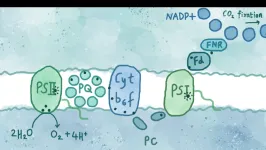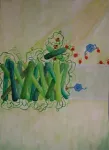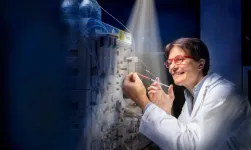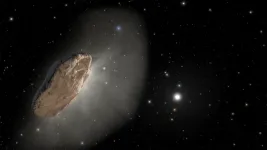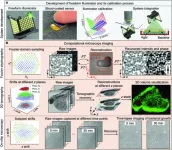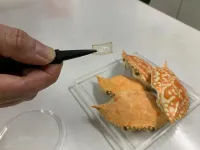(Press-News.org) Researchers have ‘hacked’ the earliest stages of photosynthesis, the natural machine that powers the vast majority of life on Earth, and discovered new ways to extract energy from the process, a finding that could lead to new ways of generating clean fuel and renewable energy.
An international team of physicists, chemists and biologists, led by the University of Cambridge, was able to study photosynthesis – the process by which plants, algae and some bacteria convert sunlight into energy – in live cells at an ultrafast timescale: a millionth of a millionth of a second.
Despite the fact that it is one of the most well-known and well-studied processes on Earth, the researchers found that photosynthesis still has secrets to tell. Using ultrafast spectroscopic techniques to study the movement of energy, the researchers found the chemicals that can extract electrons from the molecular structures responsible for photosynthesis do so at the initial stages, rather than much later, as was previously thought. This ‘rewiring’ of photosynthesis could improve ways in which it deals with excess energy, and create new and more efficient ways of using its power. The results are reported in the journal Nature.
“We didn’t know as much about photosynthesis as we thought we did, and the new electron transfer pathway we found here is completely surprising,” said Dr Jenny Zhang from Cambridge’s Yusuf Hamied Department of Chemistry, who coordinated the research.
While photosynthesis is a natural process, scientists have also been studying how it could be used as to help address the climate crisis, by mimicking photosynthetic processes to generate clean fuels from sunlight and water, for example.
Zhang and her colleagues were originally trying to understand why a ring-shaped molecule called a quinone is able to ‘steal’ electrons from photosynthesis. Quinones are common in nature, and they can accept and give away electrons easily. The researchers used a technique called ultrafast transient absorption spectroscopy to study how the quinones behave in photosynthetic cyanobacteria.
“No one had properly studied how this molecule interplays with photosynthetic machineries at such an early point of photosynthesis: we thought we were just using a new technique to confirm what we already knew,” said Zhang. “Instead, we found a whole new pathway, and opened the black box of photosynthesis a bit further.”
Using ultrafast spectroscopy to watch the electrons, the researchers found that the protein scaffold where the initial chemical reactions of photosynthesis take place is ‘leaky’, allowing electrons to escape. This leakiness could help plants protect themselves from damage from bright or rapidly changing light.
“The physics of photosynthesis is seriously impressive,” said co-first author Tomi Baikie, from Cambridge’s Cavendish Laboratory “Normally, we work on highly ordered materials, but observing charge transport through cells opens up remarkable opportunities for new discoveries on how nature operates.”
“Since the electrons from photosynthesis are dispersed through the whole system, that means we can access them,” said co-first author Dr Laura Wey, who did the work in the Department of Biochemistry, and is now based at the University of Turku, Finland. “The fact that we didn’t know this pathway existed is exciting, because we could be able to harness it to extract more energy for renewables.”
The researchers say that being able to extract charges at an earlier point in the process of photosynthesis, could make the process more efficient when manipulating photosynthetic pathways to generate clean fuels from the Sun. In addition, the ability to regulate photosynthesis could mean that crops could be made more able to tolerate intense sunlight.
“Many scientists have tried to extract electrons from an earlier point in photosynthesis, but said it wasn’t possible because the energy is so buried in the protein scaffold,” said Zhang. “The fact that we can steal them at an earlier process is mind-blowing. At first, we thought we’d made a mistake: it took a while for us to convince ourselves that we’d done it.”
Key to the discovery was the use of ultrafast spectroscopy, which allowed the researchers to follow the flow of energy in the living photosynthetic cells on a femtosecond scale – a thousandth of a trillionth of a second.
“The use of these ultrafast methods has allowed us to understand more about the early events in photosynthesis, on which life on Earth depends,” said co-author Professor Christopher Howe from the Department of Biochemistry.
The research was supported in part by the Engineering and Physical Sciences Research Council (EPSRC), Biotechnology and Biological Sciences Research Council (BBSRC) part of UK Research and Innovation (UKRI), as well as the Winton Programme for the Physics of Sustainability at University of Cambridge, the Cambridge Commonwealth, European & International Trust, and the European Union’s Horizon 2020 research and innovation programme. Jenny Zhang is a David Phillips Fellow at the Yusuf Hamied Department of Chemistry, and a Fellow of Corpus Christi College, Cambridge. Tomi Baikie is a NanoFutures Fellow at the Cavendish Laboratory. Laura Wey is Novo Nordisk Foundation Postdoctoral Fellow at the University of Turku.
END
Photosynthesis ‘hack’ could lead to new ways of generating renewable energy
2023-03-22
ELSE PRESS RELEASES FROM THIS DATE:
Simulated terrible drivers cut the time and cost of AV testing by a factor of one thousand
2023-03-22
Photos // Video
The push toward truly autonomous vehicles has been hindered by the cost and time associated with safety testing, but a new system developed at the University of Michigan shows that artificial intelligence can reduce the testing miles required by 99.99%.
It could kick off a paradigm shift that enables manufacturers to more quickly verify whether their autonomous vehicle technology can save lives and reduce crashes. In a simulated environment, vehicles trained by artificial intelligence perform perilous maneuvers, forcing the AV to make decisions that confront drivers only rarely on ...
Multiple substance use disorders may share inherited genetic signature
2023-03-22
A new study suggests that a common genetic signature may increase a person’s risk of developing substance use disorders, regardless of whether the addiction is to alcohol, tobacco, cannabis or opioids. The research, led by Washington University School of Medicine in St. Louis, eventually could lead to universal therapies to treat multiple substance use disorders and potentially help people diagnosed with more than one.
Published March 22 in the journal Nature Mental Health, the study’s findings are drawn from an analysis of genomic data from more than 1.1 million people of mostly European ancestry and a smaller ...
How vision begins
2023-03-22
Researchers at the Paul Scherrer Institute PSI have deciphered the molecular processes that first occur in the eye when light hits the retina. The processes – which take only a fraction of a trillionth of a second – are essential for human sight. The study has now been published in the scientific journal Nature.
It only involves a microscopic change of a protein in our retina, and this change occurs within an incredibly small time frame: it is the very first step in our light perception and ability to see. It is also the ...
New NIH study reveals shared genetic markers underlying substance use disorders
2023-03-22
By combing through genomic data of over 1 million people, scientists have identified genes commonly inherited across addiction disorders, regardless of the substance being used. This dataset – one of the largest of its kind – may help reveal new treatment targets across multiple substance use disorders, including for people diagnosed with more than one. The findings also reinforce the role of the dopamine system in addiction, by showing that the combination of genes underlying addiction disorders was also associated with regulation of dopamine signaling.
Published ...
Surprisingly simple explanation for the alien comet 'Oumuamua's weird orbit
2023-03-22
In 2017, a mysterious comet dubbed 'Oumuamua fired the imaginations of scientists and the public alike. It was the first known visitor from outside our solar system, it had no bright coma or dust tail, like most comets, and a peculiar shape — something between a cigar and a pancake — and its small size more befitted an asteroid than a comet.
But the fact that it was accelerating away from the sun in a way that astronomers could not explain perplexed scientists, leading some to suggest that it was an alien spaceship.
Now, a University of California, Berkeley, astrochemist ...
Smaller, denser, better illuminators for computational microscopy
2023-03-22
Seeking to expand the possibilities offered by programmable illumination, a group of researchers at the University of Connecticut developed a strategy for constructing and calibrating freeform illuminators offering greater flexibility for computational microscopy. Their calibration method uses a blood-coated sensor for reconstruction of light source positions. They demonstrated the use of calibrated freeform illuminators for Fourier ptychographic microscopy, 3D tomographic imaging and on-chip microscopy and used a calibrated freeform illuminator in an experiment to track bacterial growth.
The group’s research was published Feb. 20 in Intelligent Computing, a Science ...
Binghamton University reaches highest ever score for LGBTQ+ inclusion
2023-03-22
BINGHAMTON, N.Y. -- Binghamton University, State University of New York scored a nearly perfect ranking on the latest national Campus Pride Index, which measures a university’s commitment to LGBTQ+ safety and inclusivity on campus. The University received a 4.5 out of 5, an increase from the 3.5 scores received in previous years.
Nicholas Martin, assistant director of the LGBTQ Center at Binghamton University, sees this as a reflection of the organization’s dedication and Binghamton’s real commitment to outreach.
“Our ...
Researchers make biodegradable optical components from crab shells
2023-03-22
WASHINGTON — Researchers have developed a process to turn crab shells into a bioplastic that can be used to make optical components known as diffraction gratings. The resulting lightweight, inexpensive gratings are biodegradable and could enable portable spectrometers that are also disposable.
“The Philippines is known for delicious seafood, but this industry is also a source of large amounts of solid waste such as discarded crab shells,” said research team leader Raphael A. Guerrero, from Ateneo de Manila University in the Philippines. “We wanted to find an alternative use for crab shell ...
Beethoven’s genome offers clues to composer’s health and family history
2023-03-22
University of Cambridge Media Release
Beethoven’s genome offers clues to composer’s health and family history
UNDER STRICT EMBARGO UNTIL 11:00 US ET / 15:00 UK / 16:00 CET ON WEDNESDAY 22nd MARCH 2023
International team of scientists deciphers renowned composer’s genome from locks of hair.
Study shows Beethoven was predisposed to liver disease, and infected with Hepatitis B, which – combined with his alcohol consumption – may have contributed to his death.
DNA ...
Ludwig von Beethoven’s genome sheds light on chronic health problems and cause of death
2023-03-22
In 1802, Ludwig van Beethoven asked his brothers to request that his doctor, J.A. Schmidt, describe his malady—his progressive hearing loss—to the world upon his death so that "as far as possible at least the world will be reconciled to me after my death." Now, more than two centuries later, a team of researchers reporting in the journal Current Biology on March 22 have partially fulfilled his wish by analyzing DNA they lifted and pieced together from locks of his hair.
“Our primary goal was to shed light on Beethoven’s health problems, which famously include progressive hearing loss, beginning in his mid- to late-20s and eventually leading to him ...
